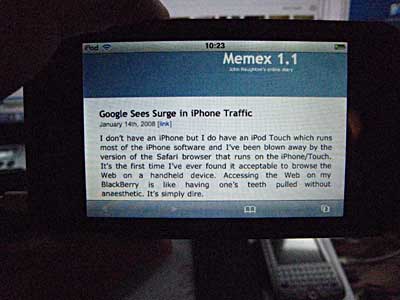Google is taking aim at Wikipedia…
Google Knol is designed to allow anyone to create a page on any topic, which others can comment on, rate, and contribute to if the primary author allows. The service is in a private test beta. You can’t apply to be part of it, nor can the pubic [sic] see the pages that have been made. Google also stressed to me that what’s shown in the screenshots it provided might change and that the service might not launch at all…
If they do launch it, then the emerging comparisons with Wikipedia will be intriguing. GMSV has a thoughtful take on it.
Now you may be thinking, “Don’t we already have a collaborative, grass-roots, online encyclopedia … Wiki-something?” Indeed we do, as the Google guys are well aware, since Wikipedia entries tend to show up in that coveted area near the top of many, many pages of Google search results. But Google’s plan is based on a model that highlights individual expertise rather than collective knowledge. Unlike Wikipedia, where the contributors and editors remain in the background, each knol represents the view of a single author, who is featured prominently on the page. Readers can add comments, reviews, rankings, and alternative knols on the subject, but cannot directly edit the work of others, as in Wikipedia. And Google is offering another incentive — knol authors can choose to include ads with their offering and collect a cut of the revenue.
Some see this as a dagger in Wikipedia’s heart, but from a user perspective, I think they look more complementary than competitive, both with their weak and strong points. Search a topic on Wikipedia and you’ll get a single page of information, the contents of which could be the result of a lot of backroom back-and-forth, but which, when approached with a reasonable degree of skepticism, offers some quick answers and a good jumping off point to additional research. Search a topic in Google’s book of knowledge and it sounds like you’ll get your choice of competing knols all annotated with the comments of other users, and if there are disagreements or differing interpretations, they’ll be argued out in the open. So it’s the wisdom of crowds as created by readers vs. the wisdom of experts (or whoever is interested enough in glory and revenue to stake that claim) as ranked by readers. I can see the usefulness and drawbacks of both.
Where this does represent a threat to Wikipedia is in traffic, if Google knols start rising to the top of the search results and Wikipedia’s are pushed down. Google says it won’t be giving the knols any special rankings juice to make that happen, but the more Google puts its own hosted content in competition with what it indexes, the more people are going to be suspicious.
All kinds of interesting scenarios present themselves. It’s not just the wisdom of crowds vs. the wisdom of ‘experts’. It’s also the Jerffersonian ‘marketplace in ideas’ on steroids. Just imagine, for example, competing Knols on the Holocaust written by David Irving (and I’m sure he will submit one) vs. one written by Richard Evans or Deborah Lipstadt.

